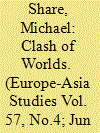|
|
|
Sort Order |
|
|
|
Items / Page
|
|
|
|
|
|
|
| Srl | Item |
| 1 |
ID:
062400


|
|
|
| 2 |
ID:
077126


|
|
|
|
|
| Publication |
2007.
|
| Summary/Abstract |
Judith Brown, in her Epilogue to Volume IV of The Oxford History of the British Empire (OHBE), states that of the legacies of the British Empire, the 'most significant of all is the legacy of the school and the university', and in particular the role of English as an international language. Brown's acknowledgement of the importance of colonial education renders all the more striking the lack of attention given to this subject in the OHBE as a whole. For example, while Volume IV contains chapters on 'Gender in the British Empire', 'Critics of Empire in Britain', 'The Popular Culture of Empire in Britain', and 'The British Empire and the Muslim World', education receives barely two dozen references, buried in the text of other chapters. These offer glimpses into the development of literacy in parts of Africa, the expansion of state educational provision in Ceylon, and the concern of Nigeria's colonial authorities regarding the socially and politically destabilizing effects of the spread of Western education; but taken together they provide no overall analysis of colonial education policies, systems of schooling or curricula. Notwithstanding what some have criticised as its ultra-orthodox overall approach, with regard to this particular field the OHBE more-or-less accurately represents the current state of research. Despite a number of interesting forays on the periphery, the history of colonial education remains a vast and largely unexplored field of enquiry: the dark continent of imperial historiography.
|
|
|
|
|
|
|
|
|
|
|
|
|
|
|
|
| 3 |
ID:
080486


|
|
|
|
|
| Publication |
2007.
|
| Summary/Abstract |
The Chief Executive's (CE's) relationship with Beijing is bound to entail a patron-client network, for Beijing has to confirm, endorse and announce the CE's official appointment after a local electoral process where the CE is elected by the 800-man Election Committee, a 'small circle' electoral method that is favourable to maintain patron-client relations. In other words, a skilful manipulation of patron-client relations can help to secure electoral success. Still, the candidate has to build up a stable reciprocal relationship with the voters to consolidate their sense of client list recognition to maintain loyalties by means of offering material or non-material benefits the clients need, or even seeking assistance from the patron Beijing. Nevertheless, such exchange of benefits sometimes may not be so successful as to earn the loyalties of all, especially the pro-democracy and voters with different political ideology. Further, the dyadic relations and loyalties of a patron's clients can shift between patrons so that one's patron can also become another's client, like the incumbent CE Donald Tsang who is the client of Beijing but also the patron of all his political appointees, and the former CE Tung Chee-hwa, who was the client of Beijing especially the former President Jiang Zemin, but Tung himself was the patron of many Hong Kong elites coopted to the various institutions and positions. Finally, Beijing's obsession with maintaining effective of indirect control over the HKSAR polity by ordaining the actual choice of a CE and hence the resulting non-contested CE elections of 2002 and 2005 in which open nominations of CE candidates were conducted but the secret balloting for the qualified candidates was not held at all. In short, while voters may become the clients of Beijing, candidates may also seek to become the client list supporter of the central government. Patron-client relation is arguably the hallmark of the insider politics in CE elections
|
|
|
|
|
|
|
|
|
|
|
|
|
|
|
|
|
|
|
|
|